- Home
- Barbara Ehrenreich
Living With a Wild God Page 2
Living With a Wild God Read online
Page 2
Butte people—“Butteans,” you could call them, though I never heard anyone do so—did everything they could to distance themselves from the mythical cowboy-land of Montana, to the point of calling their city “Butte, USA.” They even liked to extract it from the larger nation, quoting with pride the County Cork woman who saw her sons off from famine-ridden Ireland with the instruction, “Don’t stop in America. Go straight on to Butte.” Physically, Butte remains an anomaly: a cluster of multistory brick buildings, mostly empty now, and long-dead mining rigs jutting out from a mountainside like a quartz crystal sprouting out of a sheer rock face.
But today, in the shell that remains of postindustrial uptown Butte, there is no escaping the Big Sky anymore, no air pollution, for example, to shelter you from the all-encircling violence of the light. The other day I heard a Hidatsa man in Havre, Montana, struggling to answer an NPR interviewer who wanted to know what that “Big Sky” is like, and finally coming up with something about how it has “no edges,” meaning, as I heard him, that it is everywhere and could swallow you up. You could be standing firmly on the ground, trusting in gravity to keep you earthbound, and then—poof—some part of you gets sucked up into the sky, leaving just a crisp of a person behind. This is what I always imagined must have happened to a cousin of my mother’s, who lived on a farm in eastern Montana and out of the blue shot himself dead with a rifle when he was only nineteen. It was the blue, I guess, that got to him.
Copper had drawn people to Butte—the mine owners looking to get richer and the miners hoping to feed their children while their wives took in laundry. But when I went there on an achingly bright day last summer I formed a different impression—that Butte is where men went to escape from the sky. First they dug mines that ran a mile deep into the earth, which was about as far from the sky as you could get, and you had to be so desperate to get there that you’d risk being crushed in a collapsing tunnel or atomized in an explosion. Then they built the smelters to blur the sky with toxic smoke so that no miner emerging from the end of a shift would be exposed to the naked firmament, even for the short time it took him to get into the reassuring darkness of the bars, where you could count on the cigarette smoke to soften any stray intrusions of natural light. These are the lengths men will go to avoid being eaten alive by the emptiness, or at least that’s how I began to see it as a child.
But I didn’t know any history then and “class” was not available to me anyway as a category of analysis. No, the categories that shaped my childhood were much more primal than class or anything else, like gender, the sociologists have to offer. My childhood world was defined by desire and oppression, yearning and resistance, the push out and the shove back. You peek out and get poked in the eye; you reach out with your hand and it gets slapped down. So you try new angles for peeking and reaching, only to find new barriers thrown up in your way. You press against the wall, you jump to look over the top, you try crawling under until your knees are scraped and bloody.
If there was a recognizable demographic category in my childhood it was age. I entered the world as a child, of course, and I entered a world engaged in a war against children. We were the intruders; we could do nothing right; we were subject to constant rebuke. At home we were expected to work off our uselessness through chores—I was assigned, for example, to washing the dinner dishes at age six, when I had to stand on a chair to reach the sink, and when my brother was old enough, he dried. But we never did that task or any other well enough; dishes had to be rewashed, pots were not allowed to soak until the crust came off by itself. School was another site of correction. The penmanship was not neat enough, or I had neglected to carry a number while adding. Miss Sabatini, my third-grade teacher in Queens, made us sit with our hands crossed on our desks and our feet flat on the floor, all the time insisting that we “must learn self-control.” Although clearly if we had any real measure of control over ourselves and our lives we would be out in the playground, running and screaming.
In this war against children we all enter on the losing side and carry our wounds along to the next generation. My mother had been abandoned as a small child to her maternal grandparents, ostensibly because her parents couldn’t afford her, which may have been true at the time, because her father was drinking so heavily, in the normal way of miners, that her mother had had to humiliate herself by going to the shift boss at the mine and asking him for help, requesting that he give her the paychecks directly. But my mother’s parents did manage to raise their two younger children on their own, no problem, while my mother, the unwanted one, suffocated in the Victorian prison of her grandmother’s house in Nelson, British Columbia, which was devoted to the display of precious teacups and silver spoons commemorating important events in Canadian history. Maybe, in defense of my maternal grandparents, the reason they didn’t take my mother back even when they had the means to do so was that she was supposed to function as a replacement child for the daughter (who would have grown up to be my mother’s aunt) my great-grandparents had lost at any early age to some routine early-twentieth-century infectious disease. My mother’s job was to drive the sadness out of that house in Nelson, but I suspect the sadness won.
According to my mother, there had been a similar deficit in my father’s past. He worshipped his mother, whom I remember as an obese, perpetually sedentary woman with stringy hair pulled back in a bun. But his mother had eyes—and what eyes, so fascinatingly deep-set and blue!—only for her eldest son, Gordon, who was by reputation in Butte not only a drunkard, brawler, and fornicator, but a murderer too. (He was not the only man on my paternal side who was said to have killed another man. Murder was apparently not such a serious crime in Butte.) Uncle Gordon, a railroad worker like his father, was crushed under his own train at the age of thirty, either pushed or falling-down drunk. But nothing my father achieved—his degrees and eventually, by working-class Butte standards, his wealth—ever threatened Gordon’s primacy in his mother’s heart.
The loathsomeness and dependency of children seemed to drag down the entire adult female sex; at least that was the impression I formed from the vantage point of my own family, My mother’s anger was the central force field in our home, its targets divided between my father, who got to leave every morning and often delayed his return till late at night, and me. She cleaned and scrubbed and seethed and cursed, to what I saw early on was an unusual degree, since my playmates judged her to be “mean.” When in an outbreak of defiance I passed this information on to her, along with a personal declaration of hatred, she washed my mouth out with soap.
Home, in those earliest years, was a standoff between my mother’s dreams of middle-class orderliness and the routine chaos of life. When we lived in Pittsburgh I shared a tiny bedroom with my little brother where I once woke up to find him painting the wall with shit mined from his diaper. One bedroom—there must have been three total—was occupied by a married couple we took in as boarders, whose nightly fights—or, as my mother suggested by saying, “Some people enjoy that kind of thing,” sadomasochistic rituals—shook the house. When I was about twelve, at least old enough to have sprouted the first appalling pubic hairs, I slept on a fold-out coach in the “den” in our house in Waltham, Massachusetts. To get to the bathroom I had to pass through the living room, where at night my mother would be alone, ironing and working herself into rage at my father’s perpetual absence. Once, I was too terrified to get up and walk by her for a second time and resorted to wetting the bed. When I gave up on sleep and confessed, she slapped me hard before allowing me to change the sheet.
My first efforts at systematic observation of a scientific or at least naturalist sort took place at home, in an effort to understand and predict my parents’ behavior. My mother’s alternations between “nice” and “mean,” for example—did these follow a predictable pattern, in which, for example, a “nice” day, in which she might peaceably instruct me in cooking or sewing, would be inevitably followed by a day of curses, slaps, and, on my part, te
ars? Then there was the mystery of alcohol and its effects. My father had been a heavy drinker since adolescence, or so my maternal grandmother told me much later. She did not like to say anything bad about him or any of her children’s spouses, nor did she like to confide much in anyone, this quiet, stoic woman who had abandoned her first child, but she did blame my father for spreading his alcoholism to my mother, where it had begun to have a visibly deleterious effect by the time I was eight. It was then that they had their first drunk-driving accident serious enough to draw blood, coming home way after midnight (I was the babysitter), lurching, cursing, and bleeding from their faces. In my observation, alcohol changed a person by removing their customary mask, so that some “true self,” or so I thought, characterized by unconstrained anger and contempt, showed forth. The effect of the accident, though, was to leave their faces permanently altered by scars so that their “true selves” bore the label “damaged.”
Compared to home, school was spacious, austere, and well lit. At first I hated it, and routinely vomited in the morning before setting out—not deliberately, but out of fear. Fear of the teachers and, although it’s hard to admit this now, fear also of being separated from my mother, whose dark energy, after all, was the reigning force in my life, like weather, only occurring mostly indoors. I had two recurrent nightmares as a child: In one of them, I would be walking home from school the usual way but unable to find my home. Everything else on our block would be the same, but the building that we lived in would be gone without a trace. In the other one, I was being chased by lions and there never had been any home. There were good dreams too, and in them I had the ability to fly.
It wasn’t until about fourth grade that I discovered a reason to achieve in school: By doing so, I could win my father’s praise. Not that that was an unmixed benefit, because the more I rose in his esteem, the more I earned my mother’s wrath. Those were the sides that shaped up in our family—him and me versus my mother and to a lesser extent my brother and sister. My mother valued education, not having gotten beyond high school herself, and read novels whenever she wasn’t cooking or cleaning, pausing now and then to fill me in on the plot, but the family factions overshadowed our shared allegiance to books. To the extent that I was my father’s favorite, I was his proxy and her enemy. She never discouraged me from studying, but neither did she ever allow me to forget what I was—a child and, worse, a girl. “You think you’re so above it all,” she would say, referring to my shortcomings in the housecleaning department. But the “it” I was attempting to rise above would catch up with me. Just wait and see; I would end up like her. If I was lucky, that is, for it was unlikely that anyone as sullen, as withdrawn and negligent about personal appearance as I was would ever find a man.
But if you are thinking this is the usual story of dysfunction and abuse, then I’m doing a poor job of telling it, and projecting my own standards as a parent onto a time, and a class, when children were still regarded as miscreants rather than the artisanal projects that they have become today. It’s not easy to explain my parents’ complicated role in repressing and inspiring me, clamping down and letting go. Who am I, a former child, to tell the stories of these giants of the earth, whose ambitions propelled us from one city or state to another, bound to each other in our constant motion? They were driven by their own yearnings, in part, for the usual status and money things—a car, eventually the larger homes and second car—all the stuff my mother would eventually renounce as “empty materialism.” Who can blame them, when you bear in mind what they came from? By the time I was twelve, they were beginning to acquire some of the objects that seemed talismanic of a broader perspective than what had been available to them in Butte—framed Audubon prints on the wall, the Ladies’ Home Journal and Life magazines on the coffee table, new furniture as opposed to used. But their yearnings went further, toward some unspecified “more,” some great challenge or adventure. They were rebels too, and I respected that, even as I rebelled against them.
Ah, hell. Even now, insulated by so many intervening years, I could choke on the pity of it. They started out so young and brave, my parents, and ended up such sordid messes. Only one thing saved my father from dying as a slobbering drunk, and that was Alzheimer’s disease, alcohol being unavailable in the nursing home he finally expired in. As for my mother, she didn’t live long enough to find out that I grew up to have all the things she craved, that the entire package, plus some, would be delivered exactly a generation late—the adventure, the causes, the friends and hot romances. She died, too, before we could settle things between us, on her third suicide attempt. The earlier ones had led to successful stomach-pumpings, but in the last one she managed to down enough pills before anyone noticed the cessation of vital signs.
We will get back to my father soon enough, that great man-god and Shiva-like genius of self-destruction. It was he, after all, who instructed me to always ask why, and thereby started, or at least abetted, the entire project. But we are still in prehistory here, before the situation was clearly defined and the question formulated, before I was even much of a reader, when I was driven largely by the desire to explore, to get outdoors and see new places. All I required was a hill to climb, a corner to turn, a shore to run along. In Pittsburgh my wanderings were confined to the grassless enclosure made by our row houses, where all the children played, but things opened up with our move to Queens, where—this was a long time ago—there were still vacant lots grown over with trees and streets that ended in mystery. Better yet were two of the places we lived in in Massachusetts, Waltham and Hamilton, which offered woods and meadows and streams. Before I explored books and libraries, I explored with my body—pushing it up rocks or trees, hurling it through space on my bicycle. This is what I wanted before I wanted answers; I wanted to move and run and climb.
Every kid wants these things, but mine was perhaps an especially acute case of what Edward Wilson calls “biophilia.” Part of it may have been the sheer lack of alternative sites for exploration. We had no malls then, only department stores, and these had little to offer me, since the clothes my mother did not sew were ordered from the Sears catalog. Besides, the man-made environment, at least in its emerging proto-suburban form, was too numbingly repetitive—each brick or shingle designed to be exactly like any other. Nature, in contrast, excels in the art of small differences. No two branches or clouds or waves in the ocean are the same; each commands our close attention.
In fact I came to hate the built environment, both for its dullness and the way it shut me out. When a house came up on what had been a vacant lot, which was happening all the time then in Queens, that lot was barred to me, just as the common fields were barred to my British ancestors by the enclosures in the eighteenth and nineteenth centuries. The first “political” act of my life would now be categorized as ecoterrorism: I recruited another eight-year-old to help me vandalize a “model home” in a new development a block from where my family lived. We broke into the house on a weekday after five, when the realtors weren’t around, ripped up their papers, smashed windows, and defaced the clean-painted walls with hurled ink. For months I lived in fear of being caught, because I understood that the defense of trees and empty lots was worse than mischief; it was a crime.
There were no limits on my outdoor life, especially after my father taught me to ride a bike—a skill I came to value almost as much as reading. In my physical explorations, as in reading, family dysfunction served me well; just as my mother’s rage pushed me into books, her indifference—one might say neglect—left me without any outdoor limits. She made a point of not confining us, saying that she had been smothered by her overprotective grandparents, and that there would be none of that for her own children—no distances too far to go, no neighborhoods labeled as dangerous, no time of night too late. My father was equally indifferent to physical danger. He was an athletic guy—a competitive ski jumper at Butte High—who trusted his strength even after years of lab and desk work had sabotaged his upper bod
y. Once, when we lived in Queens, he took us out into the East River in a rented rowboat, where the sky turned gray and the wind and currents drove us ever farther out into the bay. We had no life jackets, nor could anyone of us except my father really swim, and although he became unnaturally silent and concentrated, I could detect no worry in his face.
Sometime in the late fifties, a hurricane struck us in Massachusetts, in Hamilton, where we were truly out in the country, surrounded by pines and elms. My father was at work, leaving my mother, brother, and sister and me to run from window to window watching the trees crash down around the house. I, naturally, wanted to go outdoors and run around and test my strength against the storm, and my mother said okay. If you ever needed evidence of her unfitness as a parent, this was it. Why did she let us go out—my brother, who was probably eight or less, and me? Maybe she thought, with the power out and the trees falling, that it was the end of the world anyway and we might as well participate firsthand. Or maybe we were having some rare moment of mother-daughter concordance in which she could see as well as I that there was freedom in the storm for anyone willing to go outside and exult in it.
So my brother and I slanted our bodies against the hundred-mile-per-hour wind and headed down to the bridge, about a quarter mile away. He fell behind, and when a tree snapped down between the two of us I looked back and to my surprise saw his face open into helpless bawling. He couldn’t see me because I had crouched down beside a stone wall, and he must have thought that I had been crushed by the falling tree. Even at that moment, I had no idea of danger. The amazing thing was that my brother, with whom I was so often locked in trivial combat, loved me enough to cry.

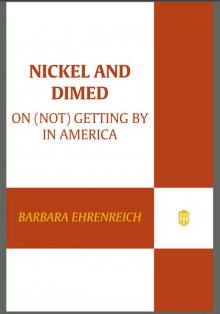 Nickel and Dimed: On (Not) Getting by in America
Nickel and Dimed: On (Not) Getting by in America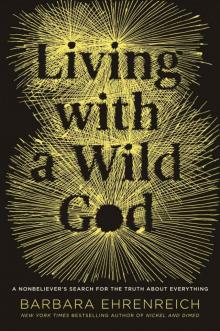 Living With a Wild God
Living With a Wild God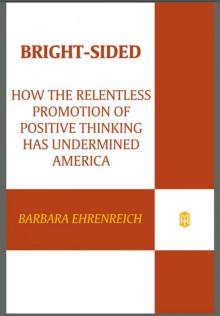 Bright-Sided
Bright-Sided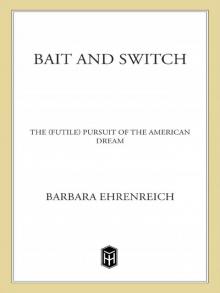 Bait and Switch: The (Futile) Pursuit of the American Dream
Bait and Switch: The (Futile) Pursuit of the American Dream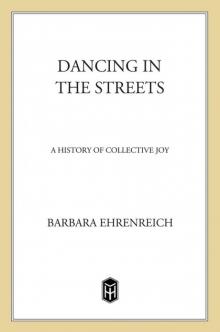 Dancing in the Streets: A History of Collective Joy
Dancing in the Streets: A History of Collective Joy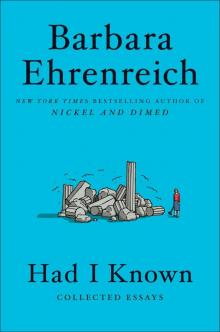 Had I Known
Had I Known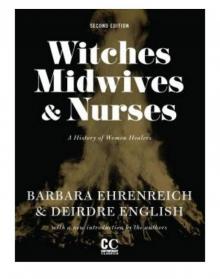 Witches, Midwives, and Nurses
Witches, Midwives, and Nurses For Her Own Good: Two Centuries of the Experts Advice to Women
For Her Own Good: Two Centuries of the Experts Advice to Women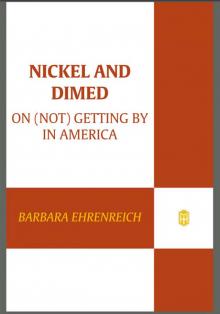 Nickel and Dimed
Nickel and Dimed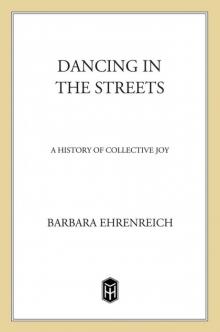 Dancing in the Streets
Dancing in the Streets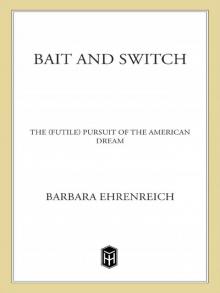 Bait and Switch
Bait and Switch